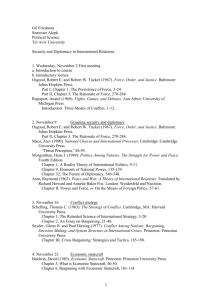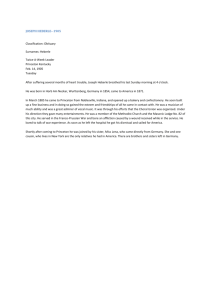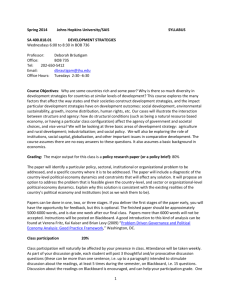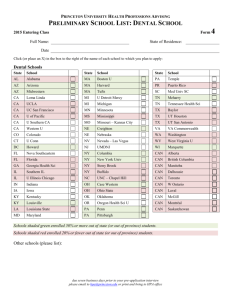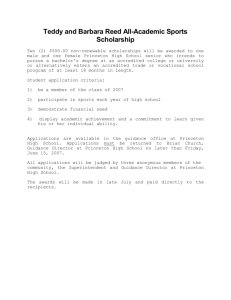syllabus - University of Rochester
advertisement
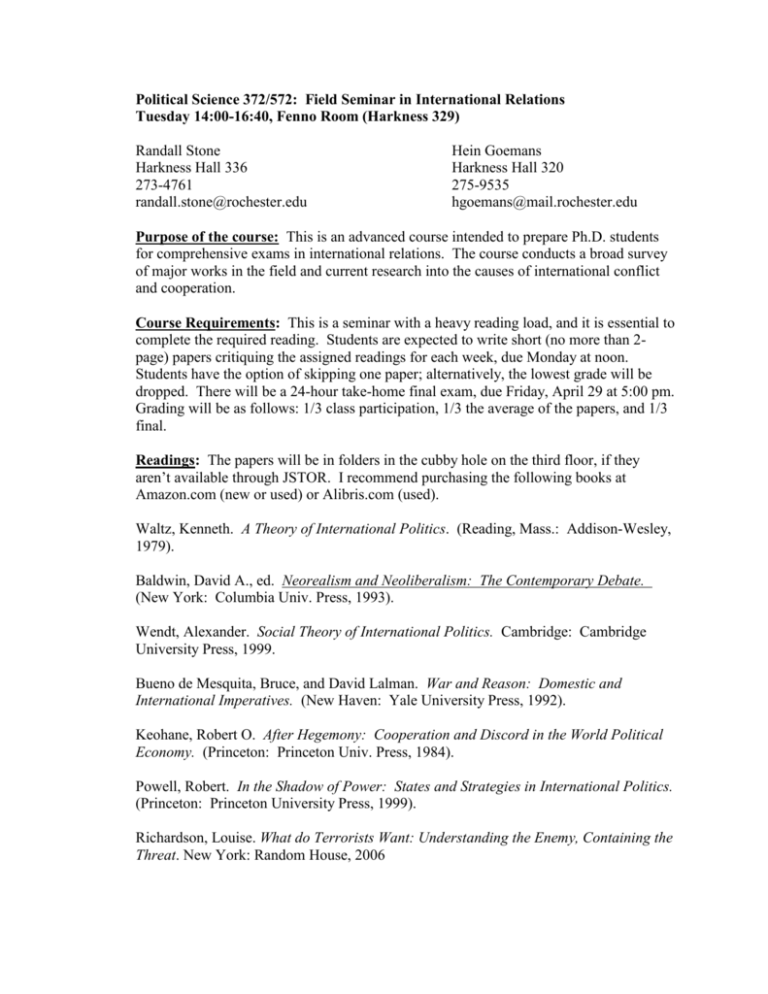
Political Science 372/572: Field Seminar in International Relations Tuesday 14:00-16:40, Fenno Room (Harkness 329) Randall Stone Harkness Hall 336 273-4761 randall.stone@rochester.edu Hein Goemans Harkness Hall 320 275-9535 hgoemans@mail.rochester.edu Purpose of the course: This is an advanced course intended to prepare Ph.D. students for comprehensive exams in international relations. The course conducts a broad survey of major works in the field and current research into the causes of international conflict and cooperation. Course Requirements: This is a seminar with a heavy reading load, and it is essential to complete the required reading. Students are expected to write short (no more than 2page) papers critiquing the assigned readings for each week, due Monday at noon. Students have the option of skipping one paper; alternatively, the lowest grade will be dropped. There will be a 24-hour take-home final exam, due Friday, April 29 at 5:00 pm. Grading will be as follows: 1/3 class participation, 1/3 the average of the papers, and 1/3 final. Readings: The papers will be in folders in the cubby hole on the third floor, if they aren’t available through JSTOR. I recommend purchasing the following books at Amazon.com (new or used) or Alibris.com (used). Waltz, Kenneth. A Theory of International Politics. (Reading, Mass.: Addison-Wesley, 1979). Baldwin, David A., ed. Neorealism and Neoliberalism: The Contemporary Debate. (New York: Columbia Univ. Press, 1993). Wendt, Alexander. Social Theory of International Politics. Cambridge: Cambridge University Press, 1999. Bueno de Mesquita, Bruce, and David Lalman. War and Reason: Domestic and International Imperatives. (New Haven: Yale University Press, 1992). Keohane, Robert O. After Hegemony: Cooperation and Discord in the World Political Economy. (Princeton: Princeton Univ. Press, 1984). Powell, Robert. In the Shadow of Power: States and Strategies in International Politics. (Princeton: Princeton University Press, 1999). Richardson, Louise. What do Terrorists Want: Understanding the Enemy, Containing the Threat. New York: Random House, 2006 Risse-Kappen, Thomas. Cooperation Among Democracies: The European Influence on U.S. Foreign Policy. Princeton: Princeton Univ. Press, 1995. Russett, Bruce, and John Oneal. Triangulating Peace: Democracy, Interdependence, and International Organizations. (New York: Norton, 2001). Schelling, Thomas. The Strategy of Conflict. (Cambridge: Harvard Univ. Press, 1960). Schultz, Kenneth. Democracy and Coercive Diplomacy. Cambridge: Cambridge University Press, 2001. Course Outline: Week One Tuesday, Jan. 23: Orientation and Overview Week Two Tuesday, Jan. 30: Classical Realism in International Relations Thucydides. The Peloponnesian War. (New York: Modern Library ed., 1982). Book I, vs. 24-146 (pp. 14-86). Macchiavelli, Niccolo. The Prince. Chpts. 15-21 (pp. 56-84.) Morgenthau, Hans J. Politics Among Nations: The Struggle for Power and Peace. (New York: Knopf, 1948, Fourth Edition, 1967). Chpts. 1-3, 10-15, 21, 27 (pp. 3-35, 145-223, 332-49, 438-56). (Note: Chpt. and page numbers vary with editions.) Herz, John H. “Idealist Internationalism and the Security Dilemma,” World Politics (Jan. 1950). Recommended: Carr, Edward H. The Twenty Years' Crisis, 1919-1939. (London: MacMillian and Co., ltd., 1946). + handout of some omitted passages from the first edition. Hobbes, Thomas. The Leviathan. Waltz, Kenneth N. Man, the State and War. (New York: Columbia Univ. Press, 1954). Stanley Hoffman: The State of War; Essays on the Theory and Practice of International Politics. New York: Frederick A. Praeger, 1965, Chapters 1, 2 and 3. Ludwig Dehio: The Precarious Balance; Four Centuries of the European Power Struggle. New York: Knopf, 1962 Edward Vose Gulick: Europe’s Classical Balance of Power; A case history of the theory and practice of one of the great concepts of European statecraft. New York: W. W. Norton, 1967 Week Three Tuesday, Feb. 6: Neorealism Waltz, Kenneth. A Theory of International Politics. (Reading, Mass.: Addison-Wesley, 1979). Helen Milner, "The Assumption of Anarchy," in Baldwin, ed, Neorealism and Neoliberalism. Gaddis, John Lewis. "The Long Peace: Elements of Stability in the Postwar International System." International Security 10, No. 4 (Spring, 1986). R. Harrison Wagner: “What was Bipolarity?” International Organization 47 (1): 77— 106, Winter 1993. Recommended: Walt, Stephen. The Origins of Alliances. (Ithaca: Cornell Univ. Press, 1987), chpts. 1, 2, 5, 8. Ikenberry, John G. After Victory. (Princeton, NJ: Princeton University Press 2000). Marc Trachtenberg, A Constructed Peace. (Princeton, NJ: Princeton University Press 1999). Week Four Tuesday, Feb. 13: Imperialism Lenin, Vladimir Ilich. Imperialism: The Highest Stage of Capitalism. Doyle, Michael. Empires. (New York: Cornell Univ. Press, 1986). pp. 19-47, 54-81, 123-61, 232-305. Gallagher, John, and Ronald Robinson. "The Imperialism of Free Trade." Economic History Review 2nd ser., 6, No. 1 (1953): 1-25. Excerpts in Harrison M. Wright, The “New Imperialism”: Analysis of Late Nineteenth-Century Expansion (Lexington: D. C. Heath, 1976): 134-58. Gilpin, Robert. War and Change in World Politics. (Cambridge: Cambridge Univ. Press, 1981). Chapters 3-6 (pp. 106-210). Recommended: Evans, Peter. Dependent Development: The Alliance of Multinational, State and Local Capital in Brazil. (Princeton: Princeton Univ. Press, 1979). Chpt. 1, pp. 14-54. Cohen, Benjamin. The Question of Imperialism. (New York: Basic Books, 1973). Schumpeter, Joseph. Imperialism and Social Classes; Two Essays. Meridian Books, 1960 Kahler, Miles. Decolonization in Britain and France. Hobsbawm, E. J. Industry and Empire: From 1750 to the Present Day. (New York: Penguin Books, 1968, reprinted 1986). Week Five Friday, Feb. 20: Constructivist Approaches Wendt, Alexander. Social Theory of International Politics. Cambridge: Cambridge University Press, 1999, Chapters 1-4, 6. Risse-Kappen, Thomas. Cooperation Among Democracies: The European Influence on U.S. Foreign Policy. Princeton: Princeton Univ. Press, 1995. Tannenwald, Nina. "Stigmatizing the Bomb: Origins of the Nuclear Taboo," International Security 29, no. 4 (Spring 2005):5–49. Recommended: Legro, Jeffrey. Cooperation under Fire: Anglo-German Restraint During World War II. (Ithaca: NY: Cornell University Press) 1995 Legro, Jeffrey. Rethinking the World: Great Power Strategies and International Order. (Ithaca: NY: Cornell University Press) 2005 Tannenwald, Nina. The Nuclear Taboo: The United States and the Non-Use of Nuclear Weapons since 1945. New York: Cambridge University Press, 2007 Finnemore, Martha. The Purpose of Intervention: Changing Beliefs about the Use of Force. (Ithaca: NY: Cornell University Press) 2004. Week Six Tuesday, Feb. 27: Complex Interdependence Keohane, Robert and Joseph Nye. Power and Interdependence: World Politics in Transition. (Boston: Little, Brown and Co., 1977, 2nd. ed., 1989). Parts I and V (pp. 360, 245-82). Hirschman, Albert O. Exit, Voice, and Loyalty: Responses to Decline in Firms, Organizations, and States. Cambridge: Harvard University Press, 1970). Chpts. 1-5 (pp. 1-61). Moravcsik, Andrew. “Taking Preferences Seriously: A Liberal Theory of International Politics.” International Organization 51 (4) (1997): 513-54. Gourevitch, Peter. "The Second Image Reversed: The International Sources of Domestic Politics." International Organization 32 (Autumn 1978): 881-912. Week Seven Tuesday, March 6: Institutional Liberalism Baldwin, David A., ed. Neorealism and Neoliberalism: The Contemporary Debate. (New York: Columbia Univ. Press, 1993). Chpts. 1-8. Keohane, Robert O. After Hegemony: Cooperation and Discord in the World Political Economy. (Princeton: Princeton Univ. Press, 1984). Chpts. 1-2, 4-7 (pp. 5-30, 49-132). Recommended: Axelrod, Robert. The Evolution of Cooperation. (New York: Basic Books, 1984). Taylor, Michael. The Possibility of Cooperation. (Cambridge: Cambridge Univ. Press, 1987). Bull, Hedley. The Anarchical Society: A Study of Order in World Politics. (New York: Columbia Univ. Press, 1977). Chpts. 1-3 (pp. 3-76). Baldwin, David. "Power Analysis and World Politics: New Trends Versus Old Tendencies." World Politics 31 (January, 1979), pp. 471-506. Krasner, Stephen, ed. International Regimes. (Ithaca: Cornell, 1983). Inis L. Claude, Jr. Words into Plowshares; The Problems and Progress of International Organization. New York, Random House, 3rd revised edition. Tuesday, Mar. 13: SPRING BREAK No class Week Eight Tuesday, Mar 20: The Democratic Peace Doyle, Michael. "Kant, Liberal Legacies, and Foreign Affairs, Part I." Philosophy and Public Affairs 12, No. 3 (Summer 1983): 205-35. Kant, Immanuel. "Perpetual Peace, a Philosophical Sketch." In Perpetual Peace and Other Essays on Politics, History and Morals. Trans. Ted Humphrey. (Indianapolis: Hackett Publishing Co., 1983.) Green, Donald, et. al. “Dirty Pool,” International Organization 55 (2) (Spring 2001): 441-68. Beck, Nathaniel, and Jonathan Katz. “Throwing Out the Baby with the Bath Water: A Comment on Green, Kim and Yoon.” International Organization 55 (2) (Spring 2001): 487-96. Russett, Bruce, and John Oneal. Triangulating Peace: Democracy, Interdependence, and International Organizations. (New York: Norton, 2001). Slantchev, Branislav L., Anna Alexandrova, Erik Gartzke. “Probabilistic Causality, Selection Bias, and the Logic of the Democratic Peace.” American Political Science Review Vol. 99, No. 3, pp. 459-62, August, 2005. Week Nine Tuesday, Mar. 27: International Bargaining Schelling, Thomas. The Strategy of Conflict. (Cambridge: Harvard Univ. Press, 1960). Chpts. 1-3. Powell, Robert. "Crisis Bargaining, Escalation, and MAD." American Political Science Review 81, No. 3 (September 1987): 717-37. Powell, Robert. In the Shadow of Power: States and Strategies in International Politics. (Princeton: Princeton University Press, 1999). Lake, David A. "Anarchy, Hierarchy, and the Variety of International Relations." International Organization 50 (1), 1996: 1-34. Recommended: Stone, Randall. Satellites and Commissars: Strategy and Conflict in the Politics of Soviet-Bloc Trade. (Princeton: Princeton Univ. Press, 1996). Week Ten Tuesday, April 3: Deterrence and War Schelling, The Strategy of Conflict, Chpts. 8, 10. Jervis, Robert. Perception and Misperception in International Politics. (Princeton: Princeton University Press, 1976). Part I (pp. 3-113). Huth, Paul K. “Extended Deterrence and the Outbreak of War.” American Political Science Review 82: 2 (June 1988): 423-44. Fearon, James D. “Signaling versus the Balance of Power and Interests: An Empirical test of a Crisis Bargaining Model.” The Journal of Conflict Resolution 38 (2) (June 1994): 236-69. Jervis, Robert. "Cooperation under the Security Dilemma." World Politics 30, No. 2 (January 1978): 167-214. Mearsheimer, John J. Conventional Deterrence, Ithaca, NY: Cornell University Press; Chaps 1—3. Levy, Jack S. “Prospect Theory, Rational Choice, and International Relations.” International Studies Quarterly 41 (1) (March 1997): 87-112. Recommended: Powell, Robert. Nuclear Deterrence Theory: The Search for Credibility. (Cambridge: Cambridge Univ. Press, 1990). Bundy, McGeorge. Danger and Survival. (New York: Random House, 1989). Esp. pp. 578-611. Robert Pape. Bombing to Win: Air Power and Coercion in War. Ithaca, NY: Cornell University Press, 1996 Betts, Richard. Nuclear Blackmail and Nuclear Balance. (Washington, D.C.: Brookings, 1987). Week Eleven Tuesday, April 10: Theories of Rational War Bueno de Mesquita, Bruce, and David Lalman. War and Reason: Domestic and International Imperatives. (New Haven: Yale University Press, 1992), Chapters 1-5. Fearon, James D. "Rationalist Explanations for War." International Organization 49, No. 3 (Summer 1995): 379-414. Slantchev, Branislav L. “The Power to Hurt: Costly Conflict with Completely Informed States.” American Political Science Review, Vol. 47, No. 1. (March, 2003), pp. 123-135. Mark Fey & Kris Ramsay: Mechanism Design, University of Rochester, unpublished manuscript. Week Twelve Tuesday, Apr. 17: The Leader as the Unit of Analysis Downs, George W., and David M. Rocke. Optimal Imperfection? Domestic Uncertainty and Institutions in International Relations. (Princeton: Princeton Univ. Press, 1995), Chapter 3 (pp. 56-75). Goemans, Hein. War and Punishment: The Causes of War Termination and the First World War, Princeton, N. J.: Princeton University Press, 2000. Chapters 1, 2 and 4. Goemans, Hein, and Giacomo Chiozza. International Conlict and the Tenure of Leaders: Is War Still Ex Post Inefficient?" American Journal of Political Science. Volume 48 No. 3 (July) 2004: 604-619. Fey, Mark, and Hein Goemans. “Risky but Rational: War as an Optimal Gamble.” University of Rochester, unpublished manuscript. Bueno de Mesquita, Bruce, James D. Morrow, Randolph M. Siverson, and Alastair Smith, “An Institutional Explanation of the Democratic Peace.” American Political Science Review 93 (4) (December 1999): 791-808. Clarke, Kevin, and Randall W. Stone. “Democracy and the Logic of Political Survival.” Working paper, Rochester, 2006. Week Thirteen Tuesday, Apr. 24: Democratic Politics and International Bargaining Putnam, Robert D. “Diplomacy and Domestic Politics.” International Organization 42 (3) (Summer 1988): 427-61. Downs and Rocke, Chpts. 4, 5 (pp. 76-129). Schultz, Kenneth. Democracy and Coercive Diplomacy. Cambridge: Cambridge University Press, 2001. Leventoğlu, Bahar, and Ahmer Tarar. 2005. “Prenegotiation Public Commitment in Domestic and International Bargaining.” American Political Science Review 99 (3):419433. Recommended: Milner, Helen V. Interests, Institutions, and Information: Domestic Politics and International Relations. (Princeton: Princeton Univ. Press, 1997). Chpts. 1-4 (pp. 3128). Tarar, Ahmer. “International Bargaining with Two-Sided Domestic Constraints.” Journal of Conflict Resolution 45 (3) (June 2001): 320-40. Week Fourteen Tuesday, May 1: Terrorism Richardson, Louise. What do Terrorists Want: Understanding the Enemy, Containing the Threat. New York: Random House, 2006 Pape, R. A., “The Strategic Logic of Suicide Terrorism.” American Political Science Review, 97 (3): 343-361. August, 2003 Bloom, M. M. “Palestinian Suicide Bombing: Public Support, Market Share, and Outbidding.” Political Science Quarterly , 119 (1): 61-88; Spring 2004 Wintrobe, R. “Extremism, Suicide Terror, and Authoritarianism.” Public Choice 28 (1-2): 169-195; July 2006 Bueno de Mesquita, Ethan. “The Quality of Terror.” American Journal of Political Science 49 (3) (July 2005): 515-530. Recommended Arce, D.G and Sandler, T. “Counterterrorism – A Game-theoretic Analysis” Journal of Conflict Resolution 49 (2): 183-200; April 2005 Robert Pape, Dying to Win: The Strategic Logic of Suicide Terrorism, New York: Random House, 2005. Kydd, A.H. and Walter, B. F. “The Strategies of Terrorism.” International Security 31 (1): 49; Summer 2006 Friday, May 4, 5:00 pm: Final Exam Due
